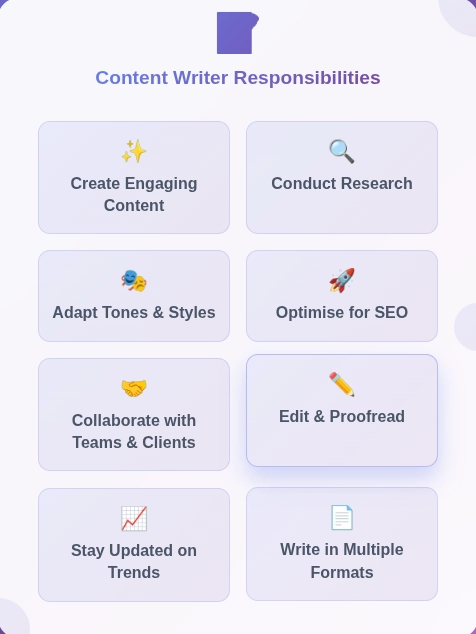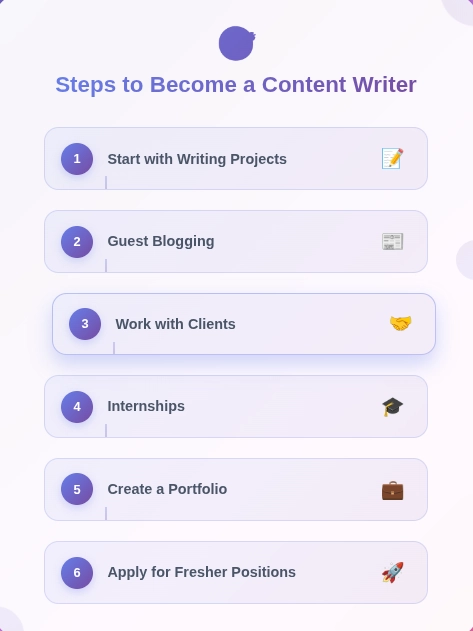Who is a Content Writer?

A content writer writes, develops, edits, and publishes content and copy for various digital platforms, including websites, blogs, videos, email marketing campaigns, advertising campaigns, social media posts, infographics, whitepapers, and more. Writers of digital content provide messages, marketing collateral, and various types of digital web copy that a company can use to market or sell products, raise brand awareness, etc.
Global Average Salary (2025):
The median level of the salary of a Content Writer in the world is $57,252 a year.
India Average Salary (2025):
The median annual wages of a Content Writer in India is around ₹ 3,19,116 Indian rupees.
Responsibilities of a Content Writer

- Create Engaging Content
Develop & share persuasive content on websites, blogs, social media, & advertisements in a manner that suits the needs of the audience. - Conduct Research
Be accurate & relevant by researching well on topics before writing. - Adapt Tones & Styles
Be able to adapt the writing style to various formats, formal, casual, persuasive, or informative. - Optimise for SEO
Use keywords & search engine optimization practices to increase the visibility of the content & boost rankings. - Collaborate with Teams & Clients
Coordinate with clients & teams to make sure that content is in line with brand directives & objectives. - Edit & Proofread
Check & edit contents to be of quality, accurate, & clear. - Stay Updated on Trends
Keep up with the trends & best practices in the industry to develop topical as well as timely content. - Write in Multiple Formats
Adapt content to various formats, including blog posts, product descriptions, social media, & email campaigns.
Common Industries & Environments
Content writers work across various sectors. Some of the key industries include:
Marketing & Advertising:
- Write blog posts, social media information, & other marketing content to market brands, products, & services.
E-commerce:
- The tasks involved in increasing traffic & conversion on e-commerce websites include writing product descriptions, landing page content, & blog articles.
Healthcare & Pharmaceuticals:
- Produce precise, understandable, & convenient information to patients, medical providers, & medical professionals.
Technology & Software:
- Author user manuals, documentation, & blog posts/articles on software products, devices, & new technologies.
Education:
- Produce educational content, including courses, guides, & informative blog posts, for academic institutions or learning platforms.
Key Skills Required for Content Writers
Technical Skills:
- Writing & Grammar: Good writing abilities and excellent knowledge of grammar, syntax, and style.
- SEO Writing: The ability to understand the rules of SEO and the way to use keywords without making the piece of writing worse than it would be otherwise.
- Content Management Systems (CMS): Basic knowledge of such content management systems as WordPress or any other.
- Research: Capacity to research issues within a short time and make informed content.
- Social Media Writing: Skills in writing for social media, such as writing catchy headlines and posts.
Soft Skills:
- Creativity: The capability to be creative and generate new, innovative ideas to use in the content.
- Adaptability: There should be the ability to switch the writing style depending on the topic, audience, and platforms.
- Time Management: Good time management to deal with various projects and deadlines.
- Pay close attention to detail: With every aspect of your work, be attentive about making sure that it is error-free and that it follows all the guidelines that it ought to.
- Communication: Good communication abilities to collaborate with clients, employees, and stakeholders.
Courses to Get These Skills
- Content Marketing Basics Course
A free, introductory course to the basics of content marketing, such as strategy, tools, branding, & user behaviour analysis. - Effective Communication Course
Master professional communication skills such as email writing & report structure, which are vital to content writers. - Content Marketing Premium Course
A comprehensive program covering storytelling, content ideation, & strategy development for blogs, emails, websites, & social media platforms.
Steps to Become a Content Writer

- Start with Writing Projects: Begin by writing for personal blogs or contributing to websites as a freelancer to build a portfolio.
- Guest Blogging: Contribute guest posts to established blogs or websites to gain exposure & build credibility.
- Work with Clients: Take on freelance writing projects to gain real-world experience & develop your writing style.
- Internships: Consider internships with content agencies or businesses to get hands-on experience & mentorship.
- Create a Portfolio: Develop an online portfolio to showcase your best writing samples & attract potential clients or employers.
- Apply for Fresher Positions: Apply for start-level writing jobs on LinkedIn, Indeed, and other job portals.
Educational & Learning Path for Content Writers
Bachelor’s Degree:
- A degree in English, Journalism, Communications, or a related field can provide a solid foundation for aspiring content writers.
Master’s Degree (Optional):
- A Master’s in English, Journalism, Communications, or Digital Marketing can further refine writing skills & open doors to higher-level positions.
Lifelong Learning:
- Stay updated with the latest trends in content writing, SEO, & digital marketing to remain competitive in the field.
Self-study & Practice
Read Books:
- Everybody Writes by Ann Handley
- The Copywriter’s Handbook by Robert W. Bly
- Writing Tools: 50 Essential Strategies for Every Writer by Roy Peter Clark
Practice with Real-World Challenges:
- Prepare Web pages, blogs, or social networking sites content. Take part in content writing competitions or write on the projects of community members.
Tools to Master:
- Learn how to use Google Docs or Scrivener to write, Yoast SEO & SEMrush to do SEO, Grammarly to correct formality, WordPress or Wix to use CMS, Canva to create images, & Google Analytics to monitor performance. These applications embrace every bit of the content creation & optimisation.
Create Personal Projects:
- Develop a blog or personal website to showcase your writing as well as practice different types of content creation.
Further Resources to Aid Your Journey
Blogs & Articles:
Online Communities:
Relevant Tools & Platforms:
FAQs
Q. What is the difference between a Content Writer & a Copywriter?
A. The content writers do write informative & engaging content, including blogs & articles, to educate & entertain the audience, & also to sustain the audience engagement, with SEO based writing. But copywriters are concerned with persuasive writing that aims at making a certain action, e.g., sales or sign-ups, take place due to emotional appeal as well as a call to action.
Q. What skills are required to become a Content Writer?
A. Among the key skills are good writing skills, research skills, knowledge of SEO, & flexibility across all formats. Also required to be efficient & quality is familiarity with content management & editing tools.
Q. How do I build a strong Content Writing portfolio?
A. Post personal blogs, write as a guest, & write in an online publication to demonstrate a variety of writing samples. Place emphasis on search engine optimized content & other formats such as articles, case studies, & product descriptions.
Q. How can I keep my Content Writing skills current?
A. Follow blogs in the industry, participate in webinars, complete online training on SEO & content marketing, & write continually with feedback. It can also be useful to join the writing communities to keep you active.









